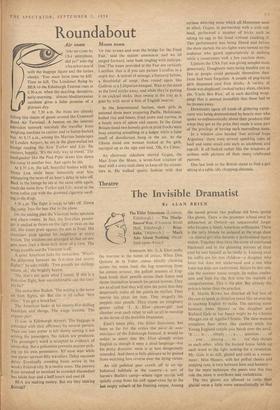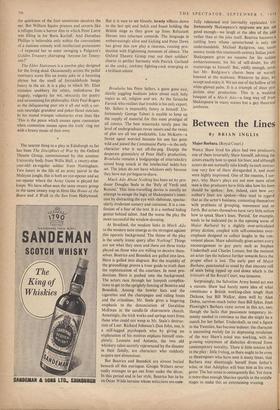Theatre
The Invisible Dramatist
By ALAN BRIEN
The Elder Statesman. (Lyceum, Edinburgh.) — The Discip- linesof War. (Cranston Street Hall, Edinburgh.) — Brou- haha. (Aldwych.) -- Much Ado About Nothing. (Strat- ford-upon-Avon.) SOMEHOW Mr. T. S. Eliot melts the mat row in the bones of critics. When Don Quixote de la Faber comes blindly clanking across the waste land, the fog streaming from his outsize armour, the gallant yeamen of Eng- land break their pencils across their knees and throw themselves beneath his proud hooves. They are so afraid that they will miss the point that they desperately make all the points he muffed. They rewrite his plays for him. They magnify his puppets into people. They create an imaginary genius called 'T. S. Eliot—playwright' and clamber over each other to call us all to worship at the shrine of the Invisible Dramatist.
Eliot's latest play, The Elder Statesman, has been so far for the critics the piece de non- resistance of the Edinburgh Festival. It would be unfair to assert that Mr. Eliot already writes English as though it were a dead language—but his prosy dramatic verse is at best dangerously wounded. And there is little pleasure to be gained from watching him reverse over the dying victim.
An old political peer crawls off to an up- holstered bolthole in the country—a sort of baron's Butlin's camp—where rigor mortis will quietly creep from his stiff upper-class lip to the last empty suburb of his freezing corpse, Among the sacred groves two profane old loves. sprout like ghosts. There is the grammar school swot he debauched at Oxford—an unsuccessful forger who became a South American millionaire. There is the tarty blonde he seduced at the stage door a chorus girl who became a professional merry widow. Together they twist the screw of emotional blackmail and in the gleaming mirrors of their eyes he sees himself as he really is. Leaning over his coffin are his two children—a daughter who loves but does not understand and a' son who hates but does not understand. Before he dies out- side the summer house temple, he makes confes- sion and feels for the first time the warmth of comprehension. This is the plot. But already the pr&is is better than the practice.
E. Martin Brown has directed all but two of the cast to speak at dictation speed like an exercise in teaching English by radio. The opening scene between Anna Massey as the daughter and Richard Gale as her flailed might be by Charles Morgan out of Agatha Christie. The slow-motion trivialities float down like confetti while the Young England couple join hands over the anvil.
'It ........simply . . a . question . . . of . • . you . . . staying . . . to . . . tea' they dictate to each other, while the hushed house holds up each word to the light seeking for a revelation. Mr. Gale is as still', glazed and cold as a monu- ment: Miss Massey, with her puffed cheeks and popping eyes, is torn between ham and hamster-- for the more technique she pours into this tiny role the more it overflows into melodrama.
The two ghosts are allowed to rattle their glacial verse a little more naturalistically so that the quickness of the foot sometimes deceives the ear. But William Squire prances and cavorts like a refugee from a horror film in which Peter Lorre was filling in for Boris Karloff. And Dorothea Phillips is believable only within the conventions of a matinee comedy with intellectual pretensions —I expected her to enter swinging a Palgrave's Golden Treasury chirruping 'Anyone for Tenny- son?'
The Elder Statesman: is a zombie play designed for the living dead. Occasionally across the pallid mortuary scene flits an ironic joke or a haunting phrase but the smell of formaldehyde hangs heavy in the air. It is a play in which Mr. Eliot mistakes snobbery for ethics, melodrama for tragedy, vulgarity for wit, obscurity for poetry and sermonising for philosophy. Only Paul Rogers as the deliquescing peer sits it all out with a cer- tain neuralgic grandeur and poker-faced stoicism. In his muted trumpet voluntaries even lines like 'This is the peace which ensues upon contention when contention ensues upon the truth' ring out with a brassy music of their own.
The nearest thing to a play in Edinburgh so far has been The Disciplines of War by the Oxford Theatre Group, commissioned by this amateur University body from Willis Hall, a twenty-nine- year-old' ex-regular soldier from Nottingham. Two hours in the life of an army patrol in the Malayan jungle, this is both an eye-opener and an ear-opener where the Army Game is played for keeps. We have often seen the same sweaty group in the same sweaty trap in films like Home of the Brave and A Walk in the Sun from Hollywood. But it is rare to see bloody, bawdy villeins down to the last spit and belch and boast holding the British stage as they grow up from Reluctant Heroes into reluctant cowards. The language is embarrassingly alive and kicking and Peter Dews has given this raw play a raucous, rousing pro- duction with frightening moments of silence. The Oxford Theatre Group roar out their soldiers' chorus in perfect harmony with Patrick Garland as the cocky, cockney fighting-cock emerging as a brilliant soloist.
Brouhaha has Peter Sellers, a goon gone east, dizzily juggling badtaste jokes about, such holy topics as oil, religion and sex. As the farouche Farouk who realises that trouble is his only export, Mr. Sellers is impossibly funny in himself. Un- fortunately George Tabori is unable to keep up the supply of material for this most prodigal of all comics. The best wisecracks rarely pass the level of undergraduate revue sneers and the twists of plot are all too predictable. Leo McKern—a Soviet agent worried because his son has gone wild and joined the Communist Party—is the only charaCter who is not off-the-peg. Despise the desperate gimmickry of Peter Hall's production, Brouhaha remains a hodgepodge of smartaleckry aimed bang smack at the intellectual teddy-boy set. The jokes do not have whiskers only because they have not yet begun to shave.
Much Ado About Nothing has been set by pro- ducer Douglas Seale in the 'Italy of Verdi and Rossini.' This time-travelling device is usually an attempt to escape the logic of Shakespeare's inten- tion by distracting the eye with elaborate, spectac- ularly irrelevant scenery and costumes. It is a con- fession of a fear of the text. It is a method hiding genius behind talent. And the worse the play the more successful the window-dressing.
At Stratford, the weakest links in Much Ado to the modern taste emerge as the strongest against this operatic background. The theme of the play is the sourly ironic query after Nothing? Things are not what they seem and there are three tricks played on those who are willing to deceive them- selves. Beatrice and Benedick are gulled into love. Hero is gulled into disgrace. But the stupidity of the groundlings proves a truer guide to truth than the sophistication of the courtiers. In most pro- ductions Hero is pushed into the. background. The actors race through her lumpish complica- tions to get to the sprightly fencing of Beatrice and Benedick. Among the bowler hats and the cigarettes and the champagne and riding boots and the crinolines, Mr. Seale gives a lingering emphasis to the denunciation of Geraldine McEwan in the candle-lit chiaroscuro church. Amazingly, the trick works and springs tears from those who could not weep at Mr. Seale's destruc- tion of Lear. Richard Johnson's Don John, too, is a stiff-legged psychopath who by giving no explanation of his motives explains himself com- pletely. Leonato and Antonio, the two old whiskery rakes secretly rejuvenated by the disaster in their family, are characters who suddenly acquire new dimensions.
But Beatrice and Benedick are almost buried beneath all this meringue. Googie Withers never really manages to get out from under the decor. In this period and in her style, Beatrice has to be an Oscar Wilde heroine whose witticisms are care- fully rehearsed and inevitably applauded. Un- fortunately Shakespeare's epigrams are just not good enough—we laugh at the idea of the joke rather than at the joke itself. Beatrice becomes a rattling bore whose spinsterhood is only too understandable. Michael Redgrave, too, seems uneasy inside this nineteenth-century Italian joker. Shakespeare gives no reasons for his sudden embarrassments, his fits of self-doubt, his shY mutterings to himself. But, oddly enough, never has Mr. Redgrave's charm been so warmly beamed at the audience. Whatever he does, we accept and enjoy it. We eat out of the hollow of his white-gloved palm. It is a triumph of sheer pro- jection over production. This is a wedding bouquet of a Much Ado—a long way off from Shakespeare in many scenes but a gay theatrical jamboree.



































 Previous page
Previous page